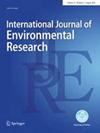利用GIS技术评价城市化对地下水资源的影响——以印度海德拉巴为例
IF 2.6
4区 环境科学与生态学
Q3 ENVIRONMENTAL SCIENCES
引用次数: 12
摘要
海德拉巴是印度发展最快的大城市之一,对其环境产生了重大影响。城市不受控制的扩张和致密化严重影响了地表水和地下水资源。为了更好地理解、恢复和防止这些重要资源的未来恶化,有必要了解城市发展对环境的各种影响。该分析使用了从不同来源获得的历史地下水水位和水质数据以及实地研究数据。在某些情况下,通过提供某些标准对缺失的数据点进行了插值和验证。地下水位年变化率图显示了污水和其他流出物补给活动的位置,以及工业和一些中上阶层住宅区的过度开发。然后将从地下水质量分析中获得的结果与印度统计局(BIS)以及世界卫生组织(WHO)的饮用水标准进行比较。据观察,许多水样的重金属元素和细菌的形成超过了允许的限度,不适合饮用。确定了从不符合世卫组织和国际清算银行标准的饮用水使用条件的地点取得的水样。将这些结果与地下水位变化率图进行叠加,建立城市地下水补给及其对地下水水质影响的关系。本文章由计算机程序翻译,如有差异,请以英文原文为准。
Assessment of Impact of Urbanization on Groundwater Resources using GIS Techniques- Case Study of Hyderabad, India
Hyderabad is one of the fastest growing Indian megacities which have significant impact on itsenvironment. The surface and groundwater resources are severely affected by uncontrolled expansion anddensification of the city. For the better understanding, recovery and to prevent future deterioration of thesesignificance resources, it is necessary to have knowledge of the impact of urban growth in various ways onenvironment. Historical groundwater level and quality data obtained from different sources as well as by fieldstudy data is used for this analysis. In some cases missing data points were interpolated and verified byproviding certain criteria. The map of rate of groundwater level change per year showed the locations ofrecharge activity by sewage and other effluents as well as overexploitations by industrial and some uppermiddle class residential areas. The results obtained from groundwater quality analysis are then compared withthe BIS (Bureau of India) as well as WHO (World Health Organization) standards for drinking water. It hadbeen observed that many water samples had heavy metal elements and bacterial formation above permissiblelimits and it is not suitable for drinking purpose. The water samples obtained from locations which do notqualify for drinking water use according to WHO as well as BIS standards are identified. These results are thenoverlapped with map of rate of groundwater level change to establish the relation between urban groundwaterrecharge and its effect on groundwater quality.
求助全文
通过发布文献求助,成功后即可免费获取论文全文。
去求助
来源期刊
CiteScore
5.40
自引率
0.00%
发文量
104
审稿时长
1.7 months
期刊介绍:
International Journal of Environmental Research is a multidisciplinary journal concerned with all aspects of environment. In pursuit of these, environmentalist disciplines are invited to contribute their knowledge and experience. International Journal of Environmental Research publishes original research papers, research notes and reviews across the broad field of environment. These include but are not limited to environmental science, environmental engineering, environmental management and planning and environmental design, urban and regional landscape design and natural disaster management. Thus high quality research papers or reviews dealing with any aspect of environment are welcomed. Papers may be theoretical, interpretative or experimental.

 求助内容:
求助内容: 应助结果提醒方式:
应助结果提醒方式:


